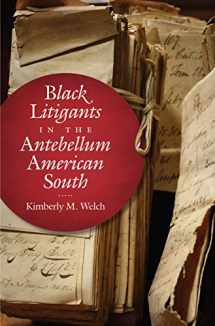
Black Litigants in the Antebellum American South (The John Hope Franklin Series in African American History and Culture)
Book details
Summary
Description
In the antebellum Natchez district, in the heart of slave country, black people sued white people in all-white courtrooms. They sued to enforce the terms of their contracts, recover unpaid debts, recuperate back wages, and claim damages for assault. They sued in conflicts over property and personal status. And they often won. Based on new research conducted in courthouse basements and storage sheds in rural Mississippi and Louisiana, Kimberly Welch draws on over 1,000 examples of free and enslaved black litigants who used the courts to protect their interests and reconfigure their place in a tense society.
To understand their success, Welch argues that we must understand the language that they used--the language of property, in particular--to make their claims recognizable and persuasive to others and to link their status as owner to the ideal of a free, autonomous citizen. In telling their stories, Welch reveals a previously unknown world of black legal activity, one that is consequential for understanding the long history of race, rights, and civic inclusion in America.


We would LOVE it if you could help us and other readers by reviewing the book
Book review



